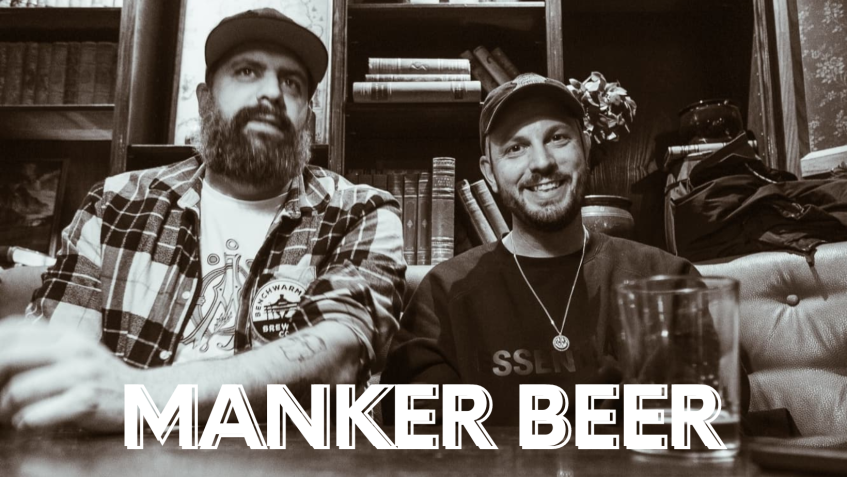It is soon time to pack my bags and head for Copenhagen and the Copenhagen Beer Celebration! Days, weeks and months of waiting is about to come to an end, but no sleep ’til Brooklyn and more pre-cbc interviews to come (Surly, Westbrook etc). Today we put focus on one of the newer American breweries, a small farmhouse brewery located in Texas Hill Country – Jest King Craft Brewery. We had a quick Q&A with Jeff Stuffings, who started up the brewery together with his brother Michael Steffing. Today Jester King is made up by the two brothers, along with fellow brew connoisseurs Ron Extract and Jordan Keeper and aesthetics director Josh Cockrell. Some of their beers have shown up in Europe, impressive as they are still focusing on their core markets in the US and many american beer geeks have a hard time finding their beers.
MankerBeer (MB): Jester King is a fairly new brewery but has received a lot of attention and appreciation among beer lovers, how come you and your brother Michael decided to set up shop and open a brewery? Did you have any prior experience with brewing and beer?
Jeffrey Stuffings (JS): I think our reasons for opening a brewery are pretty similar to the ones that motivate a lot of other brewers. We love the brewing process, creating and shaping flavor and aroma, and attempting to guide fermentation in interesting ways. Our prior experience comes from homebrewing. We’ve also had a lot of help from other professional brewers such as Real Ale in Blanco, Texas and Russ Beattie formerly of Dark Horse Brewing in Marshall, Michigan.
MB: Your beers sell out immediately and by every week the demand appears to be increasing – how do you handle the pressure from bars, beer shops and beer lovers who want to sell/try your beer?
JS: One thing we’ve been pleased to see is that a lot of the retailers we work with understand that we don’t make very much beer and that our beer takes a relatively long time to make. Very few retailers have dropped us because we don’t have a particular beer available at a certain time. I think beer lovers appreciate openness and good communication from a brewery. We’re an open book about our process, ingredients and recipes, and we try to keep people well informed with the latest news about our beer.
MB: The brewery is situated in a beautiful old farmhouse, which you yourselves brought from Victoria, Texas. It really adds something extra to the brewery. Do you have any expansion plans and how would they be integrated in the current brewery?
JS: Our expansion plans involve adding more temperature controlled space for the oak fermentation and maturation of our beer. We also seek to find a permanent location for our coolship and build a cellar for our spontaneously fermented beer. Any expansion we do will be certain to protect the beauty of our surrounding land.
MB: I feel that almost every US state have their own weird and often contradictory laws on alcoholic beverages; How come Texas wineries but not breweries can sell their products on (or even off site)?
JS: The double standard that allows wineries to sell their wine directly to the public but does not allow breweries to sell their beer comes from the fact that the Texas beer market is dominated by a few very large, very powerful players. The big brewers and big distributors in Texas have traditionally made it clear that they intend to fight small brewers for every bottle and pint sold, even though small brewers in Texas only account for a very small percentage of the market. The large, powerful players have thus far had the financial resources to make sure that no political change happens. Although, we’re now seeing signs that their position may be softening as large distributors are seeing that craft beer isn’t going away.
MB: Recent changes in the Texas beer bills (SB 515-518, 639) were discussed just some weeks ago and if 515-518 would be passed – how would that change the settings and possibilities for Jester King?
JS: We’d be able to sell beer to people who come to visit our brewery. We have hundreds of visitors each week. We’d love to be able to sell them bottles and glasses of our beer. We’re also excited about the possibility of having bottle releases at our brewery. Basically, just the prospect of being able to operate a real bar or pub like breweries can do in most other parts of the world is very exciting to us.
MB: You have Ceres Park together with Stanley’s Farmhouse Pizza, except for giving you the possibility to sell your beers through them – any pizza and beer combos we should try? Or any other food and beer pairings ones must try?
JS: I’m a fan of Stanley’s Beatrice pizza, which has Bechamel sauce and goat cheese. It has some delicate flavors that I like to pair with our table beer called Le Petit Prince. As far other pairings, I tend to defer to people with better culinary minds than me. I also prefer for food and beer pairings to include a recipe if possible.
MB: As a Swede I was happy to see that you were brewing Gotlandsdricka, a traditional Swedish beverage (which we unfortunately won’t see at CBC) – what is the story behind the beer? Why make a weird traditional Swedish beer?
JS: Broadly speaking, we’re fans of the farmhouse brewing tradition, which tends to yield very dry beer with complex flavors and a few rough, rustic edges. We also have interest in these beers because they were brewed before the discovery and widespread use of pure culture brewer’s yeast (Saccharomyces Cerevisiae). Given our broad interest in the farmhouse brewing tradition, we like to explore how different parts of the world historically made these beers, which led us to our interest in Gotlandsdricka. That and we thought “Viking beer” sounded cool.
MB: I read somewhere that you try to limit your collaborations, why is that?
JS: It’s not so much that we try to limit our collaborations, but that we want our collaborations to be meaningful. I’ve had many collaboration beers that were very good, but left me wondering what each individual brewery actually contributed. I’ve also had collaboration beers that left me thinking that brewery A could have just as easily made that beer without brewery B. When we take on a collaboration, we want it to clearly have an element from each participant and hopefully be better than the sum of its parts.
MB: Texas haven’t been famous for their breweries, but a lot has happened lately? What up and comers do we have to try or know about?
JS: I’m a big fan of Live Oak Pilz and Hefeweizen. I think it’s hard to find American breweries doing these styles better than them.
MB: How would you explain the rising interest in craft beer all over the US and do you see any risks with it?
JS: I’ve heard Garrett Oliver of The Brooklyn Brewery say that what we’re currently seeing is a return to what used to be normal in the United States. Prior to Prohibition there was a rich culture of local and neighborhood breweries. We’re getting back to that. One of my theories is that as information becomes more easily accessible and people become more aware of great culinary and beverage traditions, it’s more difficult for mass-marketed, lowest common denominator products to completely dominate. When people become more and more aware of the amazing diversity of flavor that’s out there, they’ll embrace new things and tend not to revert to a one size fits all approach.
I don’t see a risk in what I just described, but I do see a threat imposed by the future scarcity of resources like barley and water given our changing climate and increasing population.
MB: What should beer fans at Copenhagen Beer Celebration really not miss?
JS:The beer we’re sending that I’ve been drinking the most of is our RU-55 Barrel Aged Sour Red Ale. I like the combination of lactic acidity and dark fruit.
Thank you Jeff! Below is what Jester King will bring to CBC and for the full list of beers, check out this post. Changes may occur and not all beers are served at all three sessions.
Jester King CBC Beer List:
- Black Metal
- Das Überkind
- El Cedro
- Funk Metal
- Noble King
- RU55
- Salt Lick
- Das Wunderkind!
- Le Petit Prince






